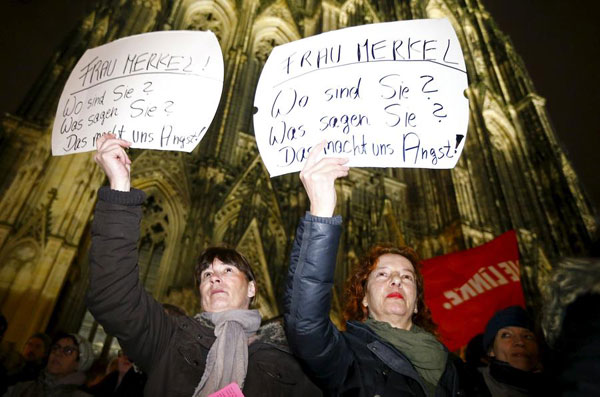No one would want to be in Merkel's shoes now
- By Sumantra Maitra
 0 Comment(s)
0 Comment(s) Print
Print E-mail China.org.cn, January 9, 2016
E-mail China.org.cn, January 9, 2016
|
|
|
Women hold up placards that read "Mrs. Merkel: Where are you? What are you saying? This worries us!" during a protest in front of the Cologne Cathedral, Germany, January 5, 2016. [Photo/Agencies] |
During a jittery new year's eve in Europe, as everyone had their midnight glass of wine while the Brussels police had an orgy and Munich was shut down due to terror threats which thankfully never materialized, I had a mundane discussion in a classified simulation board, regarding threat analysis and the future of the EU in thecoming year. The European Union, the greatest achievement of borderless human movement in the modern history of mankind and a new world order, bereft of national conflict for a quarter of century, is crumbling in a slow march to death. Among the other serious hotspots of the world, including the Middle East, the Latin America and the African continent, Europe remained an oasis of peace, even with its stagnated growth. All that shockingly changed last year with the Ukrainian war, the largest human migration since the Second World War, the Greek debacle, and the inevitable ultra-right backlash.
The biggest discussion was about the dynamics between Germany and Russia. Recently, German banks were accused of being a front for Russian money laundering, even after the EU imposed sanctions on Russia following the Crimean annexation, a move that sent shockwaves to German allies across Europe.
Germany, since the end of the Second World War, was instrumental in building an image of tolerance, moral high ground and benevolent global citizenship, and this skullduggery was not expected from the Germans, not least with Russia. Similarly, Germany recently was accused of a corrupt Gas pipeline deal with Russia's state owned Gazprom, and that is not going down well with anyone in the EU. Germany is trying to portray the Nordstream 2 project as a project strictly in the market sense, which, according to Germans, doesn't reflect the societal revulsion to Vladimir Putin's latest geopolitical maneuvers.
This argument doesn't make sense, and many people have called the bluff. According to Anders Aslund, Swedish economist from the Atlantic Council, this is an outright lie, as Putin is very clear about his motivations to use Gazprom as a means of bypassing the sanctions, and using the oil revenues to shore up Russia's slugging economy. Consumption in the EU has fallen over 21 percent, according to the WSJ and it doesn't even make practical sense.
While that is true, one needs to understand the German motivation for this act, and the European situation broadly. Europe now has a Damocles sword hanging over its head. The Central and Eastern European countries are almost on open revolt regarding the European policies on accepting millions of migrants from Arab countries as well as Africa where there are literally no wars going on. Hungary and Poland are ruled by ultra conservative, xenophobic, Euro skeptic populist parties. Even in countries where right wingers are not in power yet, there is backlash against migration. The causes of these are due to the insular cocooned nature of Central and Eastern European societies, and it underscores the irony of migration in which the Europeans themselves have undertaken. However, this is beyond the point.







Go to Forum >>0 Comment(s)